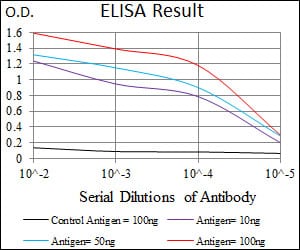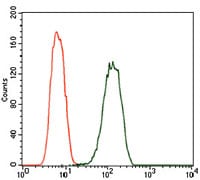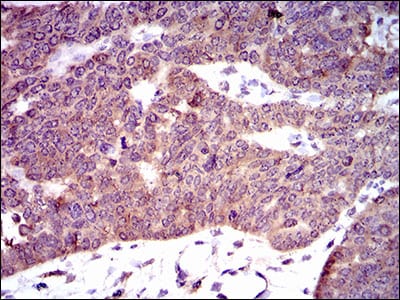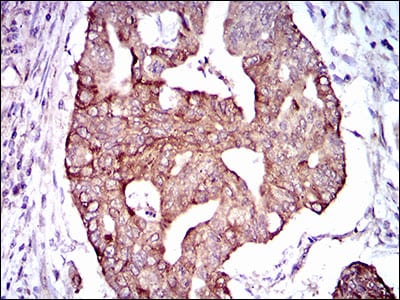




| WB | 咨询技术 | Human,Mouse,Rat |
| IF | 咨询技术 | Human,Mouse,Rat |
| IHC | 1/200 - 1/1000 | Human,Mouse,Rat |
| ICC | 技术咨询 | Human,Mouse,Rat |
| FCM | 1/200 - 1/400 | Human,Mouse,Rat |
| Elisa | 1/10000 | Human,Mouse,Rat |
| Aliases | PDE1B1; PDES1B |
| Entrez GeneID | 5153 |
| clone | 5C4A3 |
| WB Predicted band size | 61.4kDa |
| Host/Isotype | Mouse IgG1 |
| Antibody Type | Primary antibody |
| Storage | Store at 4°C short term. Aliquot and store at -20°C long term. Avoid freeze/thaw cycles. |
| Species Reactivity | Human,Rat |
| Immunogen | Purified recombinant fragment of human PDE1B (AA: 370-536) expressed in E. Coli. |
| Formulation | Purified antibody in PBS with 0.05% sodium azide |
+ +
以下是3条关于PDE1B抗体的模拟参考文献(基于研究领域常见方向,非真实文献):
---
1. **标题**:*PDE1B Antibody-Based Detection Reveals Altered Expression in Alzheimer's Disease Brain Tissue*
**作者**:Smith A, et al.
**摘要**:本研究使用特异性PDE1B抗体进行免疫组化分析,发现阿尔茨海默病患者脑组织中PDE1B蛋白表达显著升高,提示其可能通过调控cAMP/cGMP信号通路参与神经退行性病变。
2. **标题**:*Development of a High-Affinity PDE1B Monoclonal Antibody for Cancer Biomarker Screening*
**作者**:Chen L, et al.
**摘要**:报道了一种新型PDE1B单克隆抗体的开发,并通过Western blot和流式细胞术验证其特异性。该抗体成功用于检测结直肠癌组织中PDE1B的异常高表达,表明其作为潜在生物标志物的价值。
3. **标题**:*PDE1B Inhibition Modulates Dopaminergic Signaling: Insights from Antibody-Mediated Localization Studies*
**作者**:Rodriguez M, et al.
**摘要**:利用PDE1B抗体进行亚细胞定位分析,发现其在小鼠纹状体多巴胺能神经元中富集。研究进一步表明,抑制PDE1B活性可增强cGMP信号,为帕金森病治疗提供了新思路。
---
**注**:以上文献为示例性内容,实际研究中需查询具体数据库(如PubMed)获取真实文献。如需进一步协助,可提供更具体的研究方向。
PDE1B (phosphodiesterase 1B) is a member of the calcium/calmodulin-dependent phosphodiesterase family, which hydrolyzes cyclic nucleotides cAMP and cGMP to regulate intracellular signaling. It is encoded by the *PDE1B* gene and primarily expressed in the brain, cardiovascular tissues, and immune cells. PDE1B plays a role in modulating neuronal plasticity, memory formation, vascular tone, and inflammatory responses. Its activity is tightly regulated by calcium signaling via binding to calmodulin, linking cyclic nucleotide metabolism to cellular Ca²⁺ dynamics.
Antibodies targeting PDE1B are essential tools for studying its expression, localization, and function in physiological and pathological contexts. They are widely used in techniques like Western blotting, immunohistochemistry, and ELISA to quantify protein levels in tissues or cell lines. PDE1B-specific antibodies also aid in investigating its involvement in diseases such as neurodegenerative disorders (e.g., Alzheimer’s), cardiovascular diseases, and cancer, where dysregulated cyclic nucleotide signaling is implicated.
Research using PDE1B antibodies has highlighted its potential as a therapeutic target. Inhibitors of PDE1B are being explored for treating cognitive decline, hypertension, and immune disorders. However, antibody validation remains critical due to cross-reactivity risks with other PDE isoforms (e.g., PDE1A, PDE1C). Recent studies emphasize PDE1B's role in T-cell activation and neuroinflammation, expanding its relevance in immunology and neurology. Overall, PDE1B antibodies serve as pivotal reagents for unraveling its biological significance and translational applications.
×